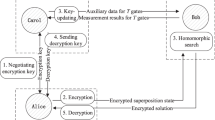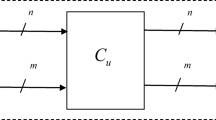Abstract
Fully homomorphic encryption enables arbitrary computation on encrypted data without decrypting the data. Here it is studied in the context of quantum information processing. Based on universal quantum circuit, we present a quantum fully homomorphic encryption (QFHE) scheme, which permits arbitrary quantum transformation on any encrypted data. The QFHE scheme is proved to be perfectly secure. In the scheme, the decryption key is different from the encryption key; however, the encryption key cannot be revealed. Moreover, the evaluation algorithm of the scheme is independent of the encryption key, so it is suitable for delegated quantum computing between two parties.

Similar content being viewed by others
References
Gentry, C.: A fully homomorphic encryption scheme. Ph.D. thesis, Stanford University (2009)
Brakerski, Z., Vaikuntanathan, V.: Efficient fully homomorphic encryption from (standard) LWE. FOCS 2011, 97–106 (2011)
Brakerski, Z., Gentry, C., Vaikuntanathan, V.: (Leveled) fully homomorphic encryption without bootstrapping. In: ITCS, pp. 309–325, Cambridge, USA, January 8–10. ACM Press, New York (2012)
Childs, A.M.: Secure assisted quantum computation. Quantum Inf. Comput. 5, 456 (2005)
Arrighi, P., Salvail, L.: Blind quantum computation. Int. J. Quantum Inform. 4, 883 (2006)
Aharonov, D., Ben-Or, M., Eban, E.: Interactive proofs for quantum computations. In: Proceeding of Innovation in Computer Science, p. 453. Tsinghua University Press, Beijing (2010)
Broadbent, A.J., Fitzsimons, F., Kashefi, E.: Universal blind quantum computation. In: Proceedings of the 50th Annual IEEE symposium on Foundations of Computer Science, p. 517. IEEE Computer Society, Los Alamitos (2009)
Sueki, T., Koshiba, T., Morimae, T.: Ancilla-driven universal blind quantum computation. Phys. Rev. A 87, 060301 (2013)
Vedral, V.: Moving beyond trust in quantum computing. Science 335(6066), 294 (2012)
Morimae, T., Fujii, K.: Blind topological measurement-based quantum computation. Nat. Commun. 3, 1036 (2012)
Morimae, T.: Continuous-variable blind quantum computation. Phys. Rev. Lett. 109, 230502 (2012)
Fitzsimons, J.F., Kashefi, E.: Unconditionally verifiable blind computation. arXiv:1203.5217
Giovannetti, V., Lloyd, S., Maccone, L.: Efficient universal blind quantum computing. Phys. Rev. Lett. 111(23), 230501 (2013)
Mantri, A., Perez-Delgado, C.A., Fitzsimons, J.F.: Optimal blind quantum computation. Phys. Rev. Lett. 111(23), 230502 (2013)
Li, Q., Chan, W.H., Wu, C.H., Wen, Z.H.: Triple-server blind quantum computation using entanglement swapping. Phys. Rev. A 89, 040302(R) (2014)
Barz, S., Kashefi, E., Broadbent, A., Fitzsimons, J.F., Zeilinger, A., Walther, P.: Demonstration of blind quantum computing. Science 335, 303 (2012)
Barz, S., Fitzsimons, J.F., Kashefi, E., Walther, P.: Experimental verification of quantum computation. Nat. Phys. 9, 727 (2013)
Rohde, P.P., Fitzsimons, J.F., Gilchrist, A.: Quantum walks with encrypted data. Phys. Rev. Lett. 109(15), 150501 (2012)
Liang, M.: Symmetric quantum fully homomorphic encryption with perfect security. Quantum Inf. Process. 12, 3675–3687 (2013)
Yu, L., Pérez-Delgado, C.A., Fitzsimons, J.F.: Limitations on information theoretically secure quantum homomorphic encryption. Phys. Rev. A 90, 050303 (2014)
Tan, S.H., Kettlewell, J.A., Ouyang, Y.K., Chen, L., Fitzsimons, J.F.: A quantum approach to fully homomorphic encryption. arXiv:1411.5254v2
Broadbent, A., Jeffery, S.: Quantum homomorphic encryption for circuits of low T-gate complexity. arXiv:1412.8766
Liang, M.: Tripartite blind quantum computation. arXiv:1311.6304
Bera, D., Fenner, S., Green, F., Homer, S.: Efficient universal quantum circuits. Quantum Inf. Comput. 10(1), 16C27 (2010)
Liang, M., Yang, L.: Universal quantum circuit of near-trivial transformations. Sci. China-Phys. Mech. Astron. 54(10), 1819–1827 (2011)
Boykin, P.O., Roychowdhury, V.: Optimal encryption of quantum bits. Phys. Rev. A 67(4), 042317 (2003)
Boykin, P.O.: Information security and quantum mechanics: security of quantum protocols. Ph.D. thesis, University of California, Los Angeles (2002)
Nielsen, M., Chuang, I.: Quantum Computation and Quantum Information. Cambridge University Press, Cambridge (2000)
Dupuis, F., Nielsen, J.B., Salvail, L.: Secure two-party quantum evaluation of unitaries against specious adversaries. Advances in Cryptology. In: Proceedings of Crypto 2010, pp. 685–706. Springer, Berlin (2010)
Fisher, K., Broadbent, A., Shalm, L.K., Yan, Z., Lavoie, J., Prevedel, R., Jennewein, T., Resch, K.J.: Quantum computing on encrypted data. Nat. Commun. 5, 3074 (2014)
Acknowledgments
This work was supported by the National Natural Science Foundation of China under Grant No. 61173157.
Author information
Authors and Affiliations
Corresponding author
Rights and permissions
About this article
Cite this article
Liang, M. Quantum fully homomorphic encryption scheme based on universal quantum circuit. Quantum Inf Process 14, 2749–2759 (2015). https://doi.org/10.1007/s11128-015-1034-9
Received:
Accepted:
Published:
Issue Date:
DOI: https://doi.org/10.1007/s11128-015-1034-9




